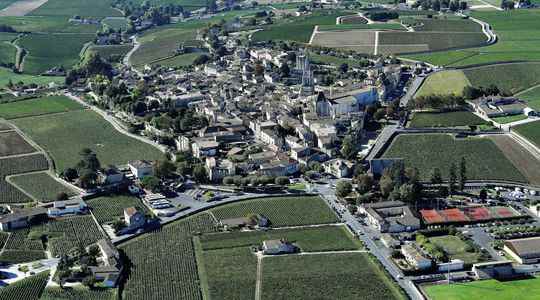“I’m charming. Don’t forget to write it down!” On the phone, a man with a slight Russian accent bursts out laughing. His name is Eli Ragimov, he is very busy, and above all far from Clos Dady, this vineyard he bought in Bordeaux after “a bad patch”. “In 2007, I was at a hotel in the Marais, Paris, for my wife’s birthday. I was a little depressed…until I saw a picture of a vineyard in the window of my ‘a real estate agency. I called my partner, Mr. Solomon, and said, ‘Igor, we’re going to buy a vineyard!'”
After several years of disappointing visits, Ragimov grabs hold of this setting protected by high stone walls. “Here, we make Sauternes, mainly”, specifies Igor Solomon, the co-manager, curly hair and good manners. He points to another parcel: “A bit of serious appellation red and white, too.” The 10-hectare property is made up of vines and a farmhouse. “I was in competition with a Chinese investor to acquire this castle. So I used my charm!” says Eli Ragimov, very proud of himself.
Disert to talk about his acquisition, the man is less so to talk about the conflict that has shaken Ukraine since the Russian invasion. “I left the USSR in 1973, I studied in Israel,” he explains, minimizing his links with Russia. Not mentioning, too, that he was the head of several commercial organizations in the country until 2010, at least. From now on, the man is concentrating on his international business and on his small property in the south of France. “This war is going to hurt ordinary people a lot. That’s all I’ll say about it,” he concludes.
At Clos Dady, stroking the head of his huge dog, Solomon shrugs, a half-smile on his lips. “We make wine here, that’s all.” Courteous, but embarrassed. Since the outbreak of the war in Europe, which notably resulted in the hunt for oligarchs close to the Kremlin, the malaise is palpable in these areas bought up by rich Russian investors. “Clients are already refusing to work with us because our estates belong to a Russian family,” confirms Alexander Pumpyansky.
The man bought, in 2008, a property in Languedoc and another in the Jura. “This war is terrible. But I have been in Geneva for twenty years!” he explains. His father, however, is not just anyone: at the head of OAO TMK, a global Russian manufacturer of tubes for the oil and gas industry, he was on a list of oligarchs identified by the US Treasury in 2018. “My family is not political,” he says. In the hushed world of wine, we oscillate between fear of being associated with Poutine… and obstinate silence.
Crates of wine sent to the French team
An hour’s drive from Clos Dady, nestled in the heart of the hill of the prestigious Saint-Emilion vineyard, Château la Grâce Dieu des Prieurs is stingy with secrets. “It’s not that I don’t want to talk to you, but, given the circumstances, you understand that… it’s delicate”, we slip into the estate, borrowed air and contrite gesticulations as a bonus. The circumstances in question? The owner of the premises is none other than Andrei Filatov, billionaire and president of the Russian Chess Federation.
“He, for sure, to be an oligarch, he’s an oligarch”, blows a local winemaker. Rarely seen between the vine shoots, we have yet known the most flamboyant man. In 2018, this Francophile had, for example, sent 25 boxes of his grand cru to the Blues, to celebrate their victory in the World Cup. The same year, Filatov had inaugurated with drum and trumpet the restoration of his castle by the architect Jean Nouvel. It was even rumored that the singer Mylène Farmer was to make an appearance there.
“All the money he must have spent here, though!” exclaims, half-admiring, half-incredulous, Stanislav Zingerenko. About twenty kilometers from Filatov’s lair, this native of Saint Petersburg contemplates the 21 hectares of his own estate, Château La Favière. The weather is mild, and you can barely hear the murmur of the road, not far from his property. “You have to differentiate between investors and small owners,” he adds. Here, everything is calm, peaceful. Far from the tumult of war. “What is happening is horrible,” he said.
“The whole industry will suffer”
This former shareholder – “minority”, he insists – in a Russian logistics company is struggling to hide his embarrassment. “My wife and I are against this war, like many Russians,” he explains, closely followed by his dog, Merlot. On Saturday, the couple joined protests against the conflict in Bordeaux and Libourne, a neighboring town. They will return there if there are others. Established for almost ten years in France, these small owners feel far, very far economic sanctions inflicted on the wealthy oligarchs. But the couple know that they too will be affected by the conflict.
From a strictly economic point of view, first: “80% of our trade is for export. Sales to Russia and Ukraine represent between 10% and 15% of our turnover”, explains Zingerenko. “Little”, he assures, but a sufficient part to be noticed, whereas, with the exception of the grands crus, the Bordeaux wine sector is struggling. “Beyond our case, the whole industry will suffer,” he predicts.
And then there is another form of suffering, more intimate, in the flesh, which the family already feels. “Yesterday, my son was insulted at school by a comrade. He was born in France, but since his parents are Russians, he was immediately associated with Putin”, laments Stanislav, who insists: “Here, we do French wine. It’s my only activity. We have nothing to do with the oligarchs… or especially with Putin.” He sighs again, takes a last look at his vines. “One way or another, we’re all going to experience the repercussions of his actions. We didn’t ask for it.”
